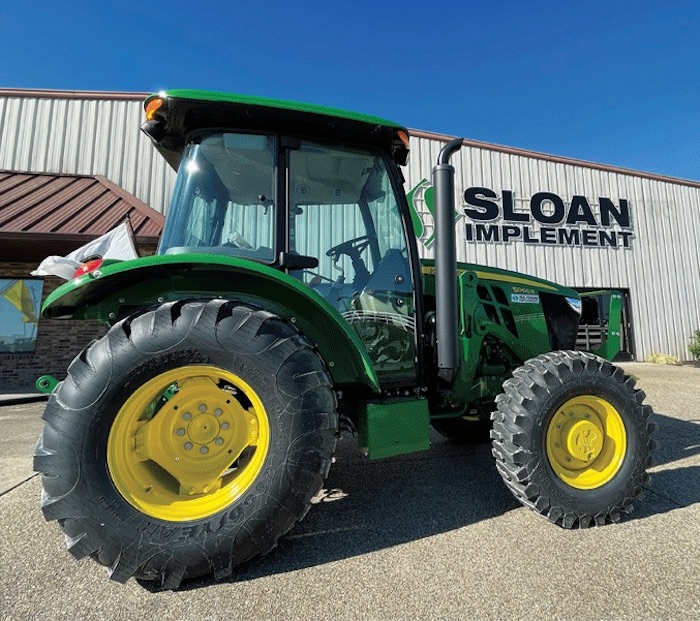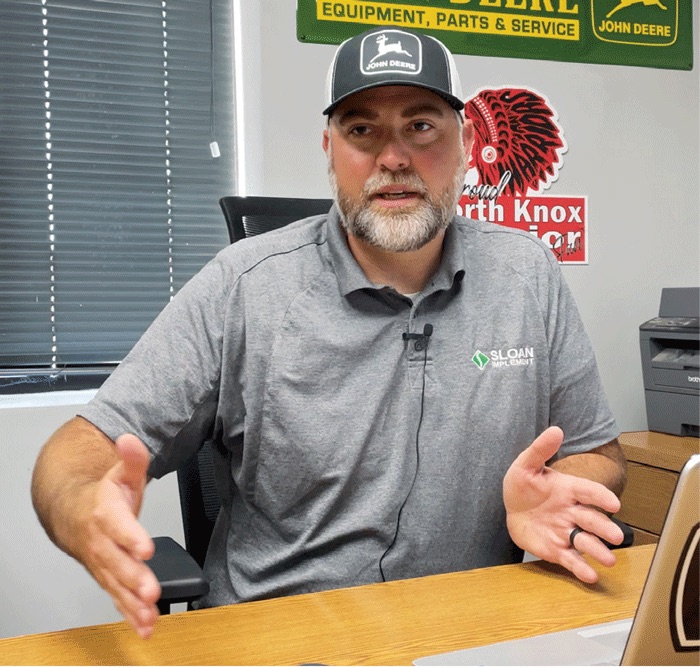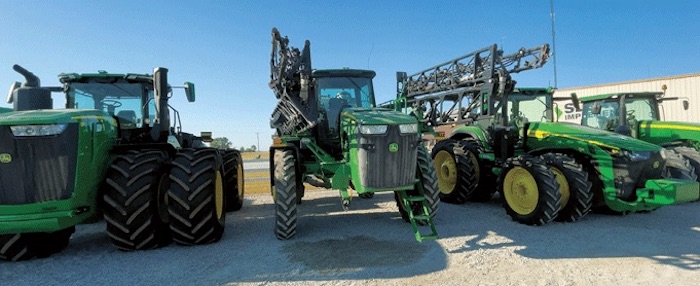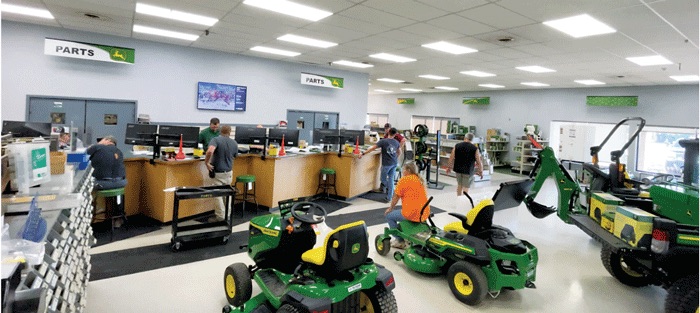Judging by the shiny, new 2024 Best Dealership Award plaque on the desk of store manager Jason Boyles, it’s been a pretty good year for Vincennes, Ind., John Deere dealer Sloan Implement.
“That’s from the local newspaper. Their readers go on the website and vote. We’ve won it a few times before, but yeah, it’s a good thing,” says Boyles, who gives Tom Brady a run for his money in the humble department.

There’s not a cloud in the sky as Vincennes, Ind., John Deere deal- er Sloan Implement puts a bow on its first harvest season after the Alliance-to-Sloan transition in mid-July. Photo by: Noah Newman
Maybe this award is a bit sweeter given how challenging 2024 was for the dealership formerly known as Alliance Tractor, which expanded from 4 stores to 26 stores after being acquired by Sloan Implement in the middle of July. Planting season got off to its wettest start in 5 years and equipment sales stalled when commodity prices dropped. But Boyles will have plenty of positives to share with his team at the upcoming monthly luncheon as harvest season concludes.
“Some soybean yields were flat to average, but almost everybody I’ve talked to has been really pleased with their corn yields,” Boyles says. “That definitely won’t hurt their attitudes when they’re looking at their buying decisions. We’ve also surprisingly moved a decent amount of used equipment since the last time you were here (September).”
Road Warriors
As Boyles gets ready to interview a candidate for a truck driver position, his next-door office neighbor, salesperson Ryan Seger, prepares for a morning road trip.
“Jim Schultz (salesperson) and I cover Illinois together, so we’re making some joint calls,” Seger says. “He’s got a customer looking to trade in a combine that we’re going to look at and appraise. Then we’ve got a couple other customers finishing up harvest that we’re going to visit.”
Seger says the sales team is being more aggressive than it has been in years past as farmers tighten their budgets. That means less time behind the desk and more time behind the wheel.
“They really like it when we come out to their farm, drop in and say hi because it shows we’re thinking of them,” Seger says. “There’s just something about an in-person visit that you can’t get with a phone call or email.”

Store manager Jason Boyles gets into the office a little bit later than his usual 7.a.m. arrival time this morning after making a sales call on the way in. The sales crew is taking a more aggres- sive approach, spending more time on the road with customers to maximize opportunities in a tough market. Photo by: Noah Newman
Although he admits the older generation tends to be more appreciative of the on-farm visits than younger customers who are usually just fine with a quick FaceTime, text or email.
“I just talked to a sales guy from another dealership who’s been there for 30 years,” Seger says. “He was telling me that some of his customers are now the sons and grandchildren of his older customers from when he first started working there. He was used to older customers coming in and getting paper receipts for everything. And then recently, he told a longtime customer’s son to come pick up a receipt, and the son said, ‘I’m not coming in for that, just text it to me.’ You’re always trying to learn the different tendencies of the different generations of customers.”
Remote communication has plenty of benefits, too. Seger sold equipment over FaceTime to out-of-state customers a few times. He can show them everything they want to see with his phone camera, which beats driving several hours to the store and possibly going home empty-handed and disappointed.
How Did We Do?
Gathering unfiltered feedback is another top objective of the farm visits. Some customers confided in Seger that they were nervous about the Alliance-to-Sloan switch after they had negative experiences with other dealerships that went through mergers. He wants to make sure those customers didn’t have the same bad experience all over again.
“I like when customers are direct. I don’t take it personally. This is business…”
What did you think about our service? What did you think about parts availability? Any concerns with tech support? What can we do better? All questions Seger plans to ask.
“I like when customers are direct,” Seger says. “I don’t take it personally, this is business. Don’t hold anything back, I tell them. If we don’t know what we’re doing wrong, then we can’t fix it.”
Longtime customer Ray McCormick hasn’t noticed any significant changes in the quality of service, but he does have some positive feedback to share with the team.
“I think they’re more on top of it, in terms of coming to help when something goes wrong,” says the Vincennes, Ind., no-tiller, whose combine caught fire during soybean harvest after a bearing went out. “They were able to fix the bearing the next day.”
McCormick’s combine wasn’t the only one to catch fire during what turned out to be a dry summer and fall across much of the region. And a brief stretch of heavy rainfall caused an entirely different set of problems after late September’s tropical storms.
“The storms came through and knocked down some corn that made it frustrating for some guys trying to finish up harvest,” Boyles says.
“There’s one customer who’s really upset because we had demoed a planter with liquid fertilizer on one of his fields,” Seger says. “He normally doesn’t put on starter fertilizer at planting, but this year we did a side-by-side trial with him. The field went flat after the storms. We were frustrated, and I know he was upset because he was looking forward to having the data. We’re hoping to do a similar trial for him next year. On this side of the river, a lot of guys use starter fertilizer, but when you cross the river, not many guys put starter on.”
On top of enjoying the access to Sloan’s precision call center — which takes some heat off precision specialists Gerald Chaplin and Seth Kocher — customers also noticed an improvement in parts availability since mid-July.
“We have a route truck that comes in daily with parts from other stores,” Boyles says. “It’s made a huge difference. It’s like having 26 more warehouses out there that we can pull inventory from. We’ve even had instances where customers went to other locations to grab a part they needed immediately.”
Offense Wins Championships
Right now, the dealership is focused on moving used equipment and keeping the shop busy over winter. Sales and service teams are being more proactive with customers when they finish harvest, identifying their equipment needs for next growing season and scheduling inspections right away.

There’s no shortage of available equipment on the lot. Salesperson Ryan Seger says the store’s used equipment inventory is as large as he’s seen it in his 3-plus years on the job. Moving used equipment is a top priority heading into 2025. Photo by: Noah Newman
“The last few years, we were so busy with sales that we’d get something in on trade and park it,” Seger says. “Now, when something comes in on trade, we immediately get it inspected, so it’s going to make it easier to sell.”
“Combine inspections are huge for us,” Boyles says. “We’re definitely pushing that. We’re making sure the parts people are letting customers at the counter know about our inspection programs.”
Service manager Jeremy Adams says they already have around 45 customers signed up for combine, tractor and sprayer inspections. Many of Sloan’s customers grow wheat, which is typically harvested in early summer, so getting their combines inspected now will help alleviate service stress when spring rolls around.
Familiar Face, New Place
Adams is finally catching his breath after a busy 3-month stretch in the service department. The longtime shop foreman was promoted to service manager around the same time as the acquisition.
“It’s been quite the change,” Adams says. “I have a lot more responsibility and I’m getting to experience certain aspects of the job that I didn’t grasp the extent of before. The billing side is something I never really enjoyed, but that’s what I’m doing now.”
As service foreman, Adams essentially served as the buffer between the previous service manager and the technicians. When somebody had a problem, they’d take it to Adams, and he’d relay it to the service manager, or, in most cases, resolve the problem himself before it even got to that point.

There’s a fair amount of store traffic as harvest wraps up. The parts department is encouraging customers at the counter to sign up for equipment inspections before winter. Photo by: Noah Newman
“Now, I get to do everything,” he says. “My first harvest season as service manager was extremely busy and long with the dry weather, but relatively smooth. We’ve still got a couple people out there trying to finish up, but the weather is slowing them down because it snowed this morning.”
Overall, he says the transition has been an “easy one” for his team in the shop. A lot of people were nervous and on edge about all the unknowns that come with such a large acquisition, but “it’s all been good,” Adams says. His prior experience as a technician and familiarity with the customer base helped prepare him for the promotion, especially when it comes to the unpredictable nature of the beast.
“One of my techs went on a job this morning that should’ve taken 30 minutes to finish up, and he wound up being there all day,” Adams says. “Stuff like that happens. Sometimes one job can turn out to be something that pushes on for a day or two. There are so many variables with this job. You get a customer telling you what’s going on, you think you know what it is, but when you get to their farm, it’s something totally different.”
Bring on 2025
Meanwhile, back in the sales department, Boyles expects 2025 to be another challenging year. But he’s confident his team can be successful and chip away at the store’s used equipment inventory if they stay positive.
“If you don’t feel confident about the deal, they probably won’t feel confident saying yes to it…”
“You don’t want to be down about a downtime because that translates when you’re trying to sell something to a customer,” Boyles says. “If you don’t feel confident about the deal, they probably won’t feel confident saying yes to it. We’re trying to stay positive and get through another possible down year, but hopefully we’ll turn the corner by the end of it.”
Seger has seen similar forecasts from Deere and other companies predicting a market that’s going to be just as challenging in 2025 as it was in 2024, but as a farmer himself, he’s always optimistic that everything is about to turn around.
“Yes, commodity prices are down, but most of our customers had higher corn yields than they expected,” Seger says. “Right now, our customers are working with their accountants and going through how much money they’ll be able to spend.”
Seger believes there could be an uptick in precision sales as farmers become more strategic with how they’re spending money. He’s already noticed a stronger demand for technology upgrades than big money items like new tractors and combines.
“Precision technology has been big for us,” Seger says. “So many times in the past, people would trade up to a newer model tractor or combine and they’d get the newer AMS (Agriculture Management Systems technology) equipment that comes with it. But since a lot of farmers are keeping their current models, there’s been a big demand for updating globes, receivers and monitors. Deere just came out with new G5 monitors, and a lot of our customers are upgrading to those.”
Learn More Online
Behind the Scenes at Sloan Implement: Our cameras were rolling during all 4 Boots on the Ground visits to Vincennes, Ind. Check out interviews with salesperson Ryan Seger, store manager Jason Boyles, precision specialist Seth Kocher and longtime customer Ray McCormick in this video.

As the holiday season approaches, Boyles and his team are thankful for the additional resources and support they’ve received from Sloan ownership and management. He feels good knowing the company has his back no matter how hard it gets in the new year.
“If you’re struggling with something, you have so many people here to lean on and help get through things,” Boyles says. “I tell everyone, don’t get bogged down into something that’s just eating up your day. Between all the employees we have now in all these stores, somebody’s probably run into this problem before, and we can get it resolved a lot faster.”
Farm Equipment's Boots on the Ground series is brought to you by Yetter Farm Equipment.
Yetter Farm Equipment has been providing farmers with residue management, fertilizer placement, and seedbed preparation solutions since 1930. Today, Yetter equipment is your answer for success in the face of ever-changing production agriculture challenges. Yetter offers a full lineup of planter attachments designed to perform in varying planting conditions, multiple options for precision fertilizer placement, strip-till units, and stalk rollers for your combine. Yetter products maximize your inputs, save you time, and deliver return on your investment. Visit them at yetterco.com.








